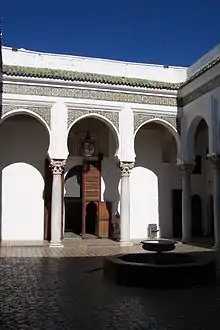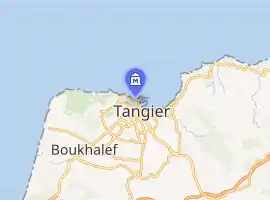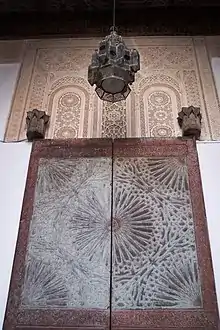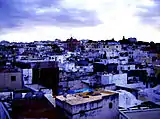Dar al-Makhzen (Tangier)
The Dar al-Makhzen or Sultanate Palace[lower-alpha 1] is a historical building and museum in Tangier, Morocco. It was the seat of residence for the Sultans of Morocco when staying in the city.
Musée des Arts Marocains et des Antiquités | |
 Tangier Museum | |

| |
| Location | Tangier, Morocco |
|---|---|
| Coordinates | |
| Type | art museum |
| Key holdings | Roman items, Carthaginian objects |
History

The edifice was built during the reign of sultan Moulay Ismail in the 17th century over the ruins of the English "Upper Castle".[1] It was constructed by Pasha Ahmad ben Ali al-Rifi,[1] general of the Jaysh al-Rifi and semi-autonomous governor of Tangiers.[2] The building is situated in the eastern part of the Kasbah[1] on one of the highest points of the city overlooking the Medina and the Strait of Gibraltar. Currently it is used by two museums, the Museum of Moroccan Arts and the archaeological Museum of Antiquities.
The Dar el-Makhzen was the palace to which the last Sultan of independent Morocco, Moulay Hafid, was exiled when the French Protectorate of Morocco forced him to abdicate. He moved in with his entire harem, slaves and personnel, altogether consisting of 168 people, and stayed in the Palace when his brother Moulay Yusef took over power after the Treaty of Fez[3]
The building is centered within two courtyards, which are decorated with wooden ceilings, marble fountains and arabesques. Some of the columns used are of Roman origin.
Museum of Moroccan Arts and Antiquities
The former Sultan’s apartments are now used by the Museum of Moroccan Arts (Musée des Arts Marocains et des Antiquités), displaying works of art from all over Morocco, amongst which are firearms decorated with marquetry, carpets, silks from Fez, and manuscripts. The Museum of Antiquities now occupies the former kitchen. It houses finds from ancient Roman sites as Lixus, Cotta and Volubilis, as well as life-size Carthaginian tomb and finds from the Tangier region from prehistory until the Middle Ages.[4]
References
Citations
- Lévi-Provençal (1936), p. 650.
- Tangiers
- W. Harris, Morocco That Was, ISBN 0-907871-13-5
- "Museums of Morocco - Musées du Maroc". Archived from the original on 2014-10-04. Retrieved 2008-05-24.
Bibliography
- Lévi-Provençal, Évariste (1936), "Tangier", Encyclopaedia of Islam, Vol. IV (1st ed.), Leiden: E.J. Brill, pp. 650–652.
